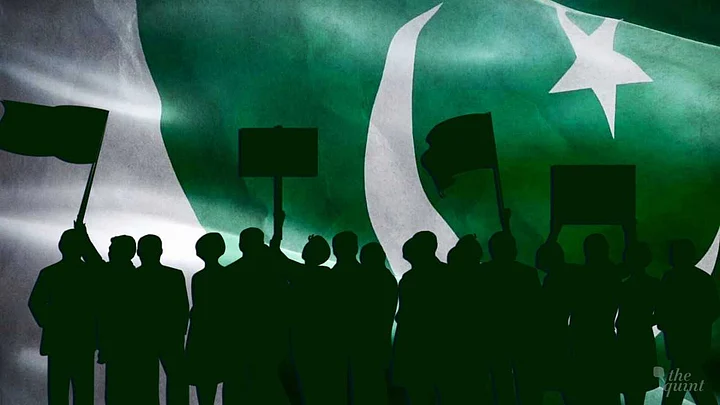What do we, Indians, talk about when we talk about Pakistan?
I propose a two-word answer here: Indian Muslims.
These days in India, public discourse involving the ‘P’ word is roughly operating dialectically. On one hand, Muslim kids are being asked to go to Pakistan, as usual, while on the other, Pakistan PM Imran Khan is being styled as a potential Nobel peace prize recipient.
While the governments of India and Pakistan are trying to understand their terms of engagement in the changed scenario, the litanies of both the left and the right of India’s social spectrum bear the tell-tale signs.
The Right Carries the Burden of Historical Grudges
“Go to Pakistan”, or “You are a Pakistani” jibes of the Hindu extremists seek to do something very basic: conflation of the Indian Muslim with a timeless perceived enemy. Not only is the Indian Muslim ‘Babur ki aulad’, a reminder of the past atrocities by ‘invaders’, he is also a Pakistani, who only dreams of Ghazwa-e-Hind project. The Indian Muslim has to shed two imposed layers of ‘otherness’ to be able to claim ‘Indianness’.
The non-Muslim right wing discourse conveniently forgets that the majority of Deobandi ulema had opposed Partition, with Maulana Shabbir Ahmed Usmani being an exception.
His faction began to support the Muslim League’s demand for Partition from the mid-1940s.
Even Maulana Maududi, the founder of the Jamaat-e-Islami, believe it or not, had also opposed Partition. A journalist who had no respect for the erudite ulema, he believed that the concept of nationalism did not sit well with Islam. True believers of Islam ought to organise themselves as a single global community. The founder of Jamaat also had no faith in the modernist leaders of the Pakistan movement. Jinnah, was no better than Ataturk, who sought to build a secular–not Islamic–state. Maududi’s change of heart happened only when he moved to the newly-formed Pakistan.
However, the Right couldn’t be bothered about nuances as above. It believes in bravely carrying the burden of historical grudges instead.
The Hindu-right also ignores the multiplicity of opinion in Pakistan, when it comes to India. While the state-sanctioned text-books do inject an average Pakistani with the ‘Hate India’ jargon, the same is challenged by the civil society that discards its own government’s propaganda.
The Left Obfuscates Historical & Geo-Political Realities
Majority communalism and minority communalism feed each other. Similarly, essentialising by the Right engenders essentialising by the Left. Post-Independence, the Indian Muslim has been, counter-intuitively, made to pay the price for Pakistan’s existence. Common sense be damned that the Indian Muslim rejected, or lacked the wherewithal to choose, Pakistan.
The Left, while rightly calling out this majoritarian exercise of ‘othering’, is guilty of obfuscation of historical and geo-political realities. To begin with, communalism in the subcontinent is not merely a fallout of the colonial ‘divide and rule’ policy. Communalism in the region preceded colonialism, though the British had indisputably widened and exploited the faultlines.
Both the Left and the Right talk about the idyllic past of India: one without the Muslims, the other without communalism.
Historian Ayesha Jalal reminds us that Shah Wali Allah, in his attempt to revive Sunni orthodoxy in the mid-18th century, called upon the Muslim rulers to wage jihad and ensure that Muslim cultural practices remained distinctly different from those of the non-Muslims. Religious tug-of-war has co-existed with secular harmony in this part of the world.
The Left and the Right Mirror Each Other
The apparitions of both communalism and secularism crowd the present symposium on Pakistan.
In a rather curious case of mirroring, the Left and the Right find it impossible to see Pakistan as a separate nation-state. The Right’s disdain for Pakistan and the Left’s defensiveness draw on the common shared past. While the Left uses the shared Indic past to build bridges, the Right treats Pakistan as a traitor, for shunning the same heritage. It can be argued that by taking these positions vis-a-vis Pakistan, their eyes are firmly planted on the Indian Muslim.
It is clear from the very lexicon, that the Right’s attacks on Pakistan are directly aimed at the Indian Muslim. The Left’s uncritical faith in Pakistani people’s goodwill towards India, however, also appears to defend those who did not cross over.
This sentimental tying up of Pakistan with the Indian Muslim community denies agency to both.
Indian Muslims Exist Independent of Pakistan
Why should the Indian Muslim be seen either as a villain or a victim? The binary does no good to the community. The Right and the Left also need to keep Pakistan out of this equation.
Asaduddin Owaisi of AIMIM, and many others, have been questioning this conflation. In his fiery speeches he firmly establishes the Indianness of Indian Muslims, that does not rely upon the goodwill of Pakistan. The Left needs to realise that no surfeit of praise for Pakistan is likely to change the fate of the Indian Muslim.
The community–with its trials, tribulations, and triumphs–exists independent of Pakistan.
During the Triple Talaq hullabaloo, many Muslim women resisted the victim label and wanted the other ‘P word’—politics—out of the equation. It is time, perhaps, to emulate this stance in a wider arena.
(At The Quint, we question everything. Play an active role in shaping our journalism by becoming a member today.)
